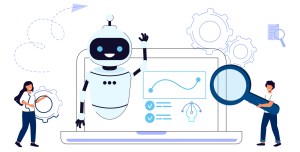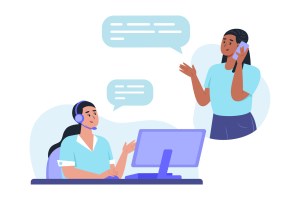Happy Customer Service Agent, Happy Customer



Explore ways ays businesses can increase customer service agent job satisfaction and overall happiness.

Kelsey Jones
With more than half of customers willing to pay more for a guaranteed better experience from the businesses they give money to, it’s more important than ever to ensure that employees at the front lines of customer communication provide exceptional service.
One way is by offering the best possible experience for the customer service agents. Higher job satisfaction will lead to better customer experiences, improved employee retention rates, and increased referrals. When customer service agents feel a sense of loyalty to and purpose with the company they work for, they are more likely to not only stay in their job, but to stay if the company goes through a rough time.
Here are ways businesses can increase customer service agent job satisfaction and overall happiness.

Better Communication
Employees are more likely to stay at a job, speak up, and have trust in their employer when there is better communication between superiors (including executives and managers) and department employees. Gallup found that regular, daily interactions and meetings between managers and employees makes a company three times as likely to have more engaged employees. This was true even if the interactions and meetings where over the phone or digital (like video chat).
This leads to stronger feelings of support. When employees feel supported by their company and their direct manager, they are happier, more connected with their work and colleagues, and more likely to provide a better experience to customers.
Better communication could also affect your bottom line. According to a study by Towers Watson and cited by Intuit Quickbooks, companies that are considered “highly effective [internal] communicators” have almost 50 per cent higher returns over the previous five years than companies that aren’t considered effective internal communicators. Employees expect their employers to be honest with them about company issues. This helps them feel more involved in the company and its success.
Technology and Tools to Get the Job Done
Many companies try to spend as little money as possible on technology and the tools needed in most customer service departments. This is parodied on TV shows: You see fictionalized support centers where employees are in colorless cubicles with outdated computers and headsets, miserable and short-tempered with customers.
This isn’t necessarily the reality. Think of any amount you spend on supplies, technology, and your customer service agents as an investment in customer loyalty. For example, if your service center has subpar headsets that make it hard to hear or be heard, your customers’ experience would be influenced, even though it isn’t the agent’s fault directly.
It’s the same with other tools, such as your social listening platforms. Find a social monitoring platform that works best for your employees (therefore making their job easier), customer requests will be taken care of more quickly and efficiently. It’s important to make your employees’ job as easy as possible so they can focus on the task at hand, instead of getting distracted by disruptive tasks, such as working on an old, constantly freezing computer.
Knowledge and Continuing Education
As the technology and tools you use to better listen to your customers change, it’s crucial for employers to spend time and energy on customer service training and education. Not only does this help your agents further develop their skills, it also allows businesses an opportunity to decrease the stress and frustration many customer service representatives may feel when they don’t have the proper tools for certain situations.
Not only should customer service onboarding cover common situations and how to handle them, regular ongoing training in the form of team workshops, online learning, or conferences should be prioritized to make sure employees stay up-to-date on the best tactics to increase customer satisfaction.
In addition, the Council for Adult and Experiential Learning (CAEL) reports that when businesses offer continuing education, employees feel like their employers are invested in them. This can lead to a higher retention rate, lower cases of absenteeism, and increased productivity.
The Importance of Autonomy
Providing a better customer service experience than your competitors is based on how customers are treated. This includes how fast your agents respond to customers’ questions or requests for help. One way to increase the timeliness of response rate is to give customer service agents more autonomy. This means giving them the independence to make decisions based on their best judgment as to what is best for the customer (and your company).
Greater autonomy leads to a higher feeling of trust between the agents and the business — and it can help customer service requests get resolved faster and more accurately. For instance, if an agent is able to give a refund without manager approval, the request is solved a lot more quickly than if manager approval is required for every refund request.
A fast response from customer service can make customers feel more valued and more like a priority. It also gives trust to the customers themselves, which helps grow a better relationship. When customers feel trusted, they are more likely to return and recommend your business to others.
Focus on increasing the happiness and job satisfaction of your customer service agents through better tools, education, communication, and independence. You are doing more than investing in your employees: You pave the way to happier customers, which usually leads to stronger brand loyalty, lower employee turnover, and higher revenue.
Learn more about Service Cloud, the #1 intelligent customer service platform that empowers companies of all sizes to deliver great service everywhere.
Share “Happy Customer Service Agent, Happy Customer” On Your Site




















